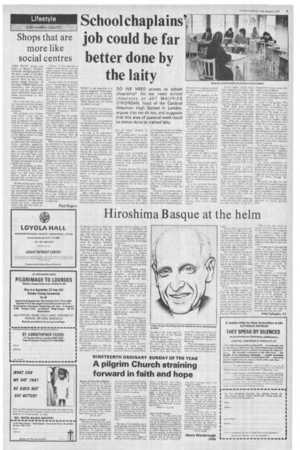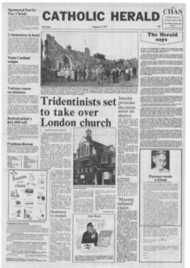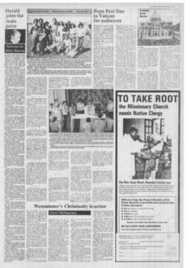Page 5, 3rd August 1977
Page 5

Report an error
Noticed an error on this page?If you've noticed an error in this article please click here to report it.
Tags
Share
Related articles
The Enigma Explained
No./ Jesuit-a Charmer Who Can Bite
The Jesuit General Who Won His Battle For The Poor
Lively Mind To Lead 36,000 Shock Troops
Pope Will Take Keen Interest In Choice Of New Leader Walk...
Hiroshima B asque at the helm
St Ignatius Loyola died exactly 421 years ago and we celebrate his feast on Sunday. His successor today is Fr Pedro Arrupe, the first Basque to lead the Order since St Ignatius himself, and the lofty, broad forehead and powerful nose show the Basque stamp.
He had a tough preparation. He was based in Hiroshima, in wartime Japan, when the atom bomb — "rain of ruin" — fell on August 6, 1945. His medical training, received before• he joined the Society of Jesus proved invaluable as he and the other Jesuits struggled through the burning city carrying victims back to the hospital they had established in the novitiate. It was a cataclysm before which the problems of today must immediately pale.
As a youth he had studied in Madrid. The city's slums scandalised him. "1 found terrible suffering — widows with children begging for bread, sick people pleading for medicine, waifs running through the streets like stray dogs."
He did what he could to help, and later went on pilgrimage to Lourdes where he saw that he was convinced were three miracles. "I asked myself, why did I come into the world? I felt that God was calling me not only to cure bodies but to cure souls."
He joined the Society of Jesus at Loyola when he was 19. Five years later, the Republican anti-clericals expelled the Spanish Jesuits so he completed his studies in the United States and Europe.
Ordained priest in 1936, he studied psychiatry but this was interrupted by superiors who
appointed him to Japan. In the western city of Yamaguchi he worked on a mission parish and became an enthusiastic admirer of the Japanese people. He learnt the language and became so proficient that he wrote eight books in it.
He worked in Japan for 27 years, and in 1958 became its first Provincial — an office he kept until he was chosen Superior General in 1965. He is still a fervent Japanophile, though he regrets "the brusque change of values that brought abortion to a country that loves children so much".
Zen — the Japanese technique of meditation and selfdiscipline — has long appealed to him, and he often sits Zenstyle in prayer in his small private chapel.
. Fr Arrupe reigns in these turbulent times with a pacifying calmness and confident frame of mind. He has put his troops unambiguously on the side of the world's poor and dispossessed.
Theological reflection remains, as always, high on the list, social communications are a vital concern, but most important of all is a dedication to social justice, especially in the Third World.
He writes: "Following the example of Christ, the Church should be above all the Church of the poor and the oppressed — the agricultural labourers, the refugees, those who suffer persecution for their Faith, those deprived of basic human rights, those relegated by the powerful and prosperous to the margins of human society. "We must ask ourselves whether all these people recognise in us the message of love and liberation which Christ brought to the world, and that they can find in the Church hope and salvation."
Of the recent killing of five Jesuits engaged in this work for the poor and suffering Fr Arrupe wrote: "The murder of Fr Grande in El Salvador seems to me a clear sign from Our Lord. The other victims lvere Fr Burnier, murdered in Brazil, and Frs Thomas and Shepherd, Smith and Brother Conway in Rhodesia.
The Lord seems once again to be showing us his preferences and pointing out the values and kind of witness he holds in es teem.
He has lifted tom obscurity for the whole world to see and crowned with martyrdom these 'faithful servants' of his, men who were faithful to him in little and humdrum affairs, men who served him in .the hungry and the thirsty, the homeless, men who loved Him in the poor by their works and sincerity.
"The Lord seems to be showing us what kind of martyr is found in today's world. The Church seems to believe that too, for in a spontaneous reaction it had not hesitated to label their deaths martyrdom. "Pope Paul VI himself used that word about the victims of Rhodesia, the bishops of Brazil applied it to Fr Burnier, and in EI.Salvador bishops, clergy and people thanked God 'for having given us the first Salvadorian martyr'."
Fr Arrupe finishes: "In order to carry out this vocation of ours the Society today must count on men imbued with the 'mind of Christ', who serve Christ without limit or reservation, who joyfully lead lives of evangelical simplicity and continuing self-sacrifice, thus offering to men an ideal for living and to the generous youth of today a model and way of life.
"This is the real secret of success in our mission, and will be the source of new vocations — 'the blood of martyrs is the seed of vocations'. This is the Jesuit that St Ignatius, the Pope, and above all the Eternal King wishes to find today in each one of us."
Fr Arrupe moves through this world of crises with a deep serenity that inspires his friends and infuriates his enemies. His optimism is well-founded. It is based on the Resurrection that is to come, whereas many today see only the tragedy of Golgotha. The two are inextricably intertwined, but the outcome is certain.
"The expense is reckoned, the enterprise is begun, it is of God, it cannot be withstood," said Edmund Campion in 1581, shortly, before being hanged, drawn and quartered at Tyburn.
The prayer of Fr Arrupe and his men today is still that of St Ignatius Loyola: "Lord Jesus, teach me to be generous, to • serve you as you deserve; to give and not to count the cost, to fight and not to heed the wounds, to toil and not to seek for rest, to labour and not to ask for any reward save that of knowing that I do your will," John Gallagher, SJ
blog comments powered by Disqus









